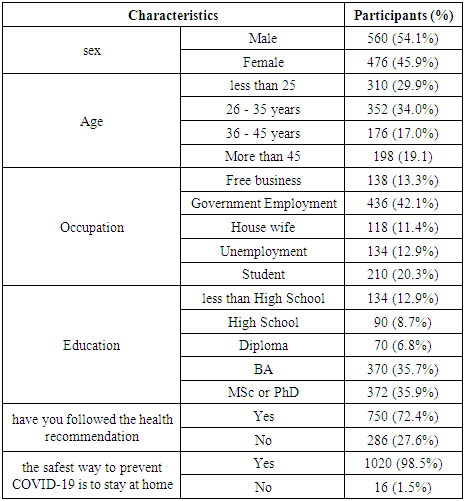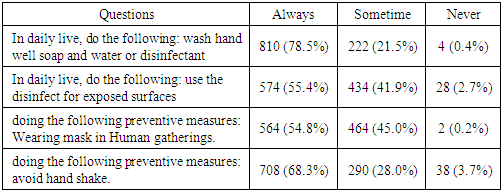-
Paper Information
- Paper Submission
-
Journal Information
- About This Journal
- Editorial Board
- Current Issue
- Archive
- Author Guidelines
- Contact Us
Food and Public Health
p-ISSN: 2162-9412 e-ISSN: 2162-8440
2020; 10(2): 55-61
doi:10.5923/j.fph.20201002.03

Quarantine and Nutritional Status is the Essential Way to Reduce the Risk of Novel Coronavirus (COVID-19): A Survey of Iraqi Society
1Ministry of Iraqi Trade, State Company for Grain Processing, Misan, Iraq
2Department of Nursing, Nursing College, Misan University, Misan, Iraq
Correspondence to: Mizher Hezam AL-Zuaidy, Ministry of Iraqi Trade, State Company for Grain Processing, Misan, Iraq.
| Email: |  |
Copyright © 2020 The Author(s). Published by Scientific & Academic Publishing.
This work is licensed under the Creative Commons Attribution International License (CC BY).
http://creativecommons.org/licenses/by/4.0/

Infections with coronavirus have been the most significant global threat in the twenty-one century. Over 200 countries with strictly two million cases exceeded the numbers of coronavirus cases of 2019. In the absence of medication for this infection, alternative methods for managing the disease's spread are desperately needed. 'Quarantine' is one of the oldest and the most common tools for controlling outbreaks of infectious diseases. The tools now available are isolation and quarantine, social distancing, and containment of the population. Quarantine may be enforced at the level of individuals or groups, and typically includes a restriction at home or facility. This study aims to examine the quarantine perception of Iraqi society, adherence to the Ministry of Health guidelines, and knowledge of strengthening the immune system by consuming certain nutrients and supplements to avoid coronavirus infection.
Keywords: Quarantine, Coronavirus, COVID-19, Nutrients, Supplements, Immune system
Cite this paper: Mizher Hezam AL-Zuaidy, Quarantine and Nutritional Status is the Essential Way to Reduce the Risk of Novel Coronavirus (COVID-19): A Survey of Iraqi Society, Food and Public Health, Vol. 10 No. 2, 2020, pp. 55-61. doi: 10.5923/j.fph.20201002.03.
Article Outline
1. Introduction
- Coronavirus disease (COVID-19) (CoV) infections have become the most prominent global threat in century twenty-one. In the first week of March\ 2020, the World Health Organization (WHO) considered that the COVID-19 as a pandemic after a devastating number of new cases were reported globally. It is an outbreak in 202 countries, areas, or territories. The last statistic was declared by world health organization (WHO) on 16 April \ 2020 is 1,991,562 confirmed cases and 130885 deaths [1]. COVID-19 pneumonia was first reported in Wuhan, Hubei Province, China, in December 2019, followed by an outbreak across the world [2]. CoV is a zoonotic pathogen that can be transmitted via animal-to-human and human-to-human interaction [3]. COVID-19 is spread by human-to-human transmission through the droplet, feco-oral, and direct contact and has an incubation period of 2-14 days. [4]. The current COVID-19 outbreak is both similar and different from the prior severe acute respiratory syndrome (SARS; 2002-2003) and the Middle East respiratory syndrome (MERS; 2012-ongoing) outbreaks. All three viral infections commonly present with fever and cough, which frequently lead to lower respiratory tract disease with poor clinical outcomes associated with older age and underlying health conditions. COVID-19 has led to more total deaths due to a large number of cases. It seems to be more transmissible than SARS and MERS [5]. Knowing that specific treatment and prevention options, such as targeted antiviral drugs and vaccines, were not yet available for COVID-19, China focused on traditional public health outbreak response tactics—isolation, quarantine, social distancing, and community containment. COVID-19 rapidly spread from a single city to the entire country in just 30 days [5,6]. The virus that causes COVID-19 infects people of all ages. However, evidence to date suggests that two groups of people are at a higher risk of getting severe COVID-19 disease. These are older people (that is people over 60 years old); and those with underlying medical conditions (such as cardiovascular disease, diabetes, chronic respiratory disease, and cancer) [4]. The most common presenting clinical symptoms are fever and cough and other non-specific symptomatology, including dyspnea, headache, muscle soreness, and fatigue [7]. Protective measures may include: Washing hands with soap and water, using alcohol-based hand cleaner to kill the virus, and maintaining at least 1-meter (3 feet) distance between yourself and anyone who is coughing or sneezing, avoid touching eyes, nose, and mouth. Make sure you, and the people around you, follow good respiratory hygiene., Stay home if you feel unwell. If you have a fever, cough and difficulty breathing, seek medical attention, and call in advance. Follow the directions of your local health authority [4]. Simple nutritional and behavior change interventions to improve nutritional status, strengthen immune function, and minimize the risk of acquisition and severity of infectious diseases [8]—the importance of micronutrients in the prevention and treatment of infectious diseases, including respiratory infections. Vitamin D is of global significance in general, and its effects are particularly relevant in specific populations (e.g., those at higher latitudes, those spending a lot of time indoors) and at particular times in the human life cycle (e.g., children, pregnant/lactating women, the elderly [9-11]. Also, the study concluded that the effects of vitamin D on the immune system suggest that vitamin D would reduce the risk of influenza [12].This study will examine the extent of the Iraqi society's commitment to the procedures of the Iraqi Ministry of Health to limit the spread of the CoV, including a commitment to quarantine and to strengthening the immune system by eating some nutrients and their supplements. This study also aims to discover the role of different information sources in Iraqi society's knowledge and perceptions of COVID-19 during this peak period.
2. Methods
- A cross-sectional, web-based study was conducted among Iraqi society about COVID19 during the last week of March 2020 after two weeks of quarantine (A healthy stone inside the house). A 21-questions survey instrument has been developed and distributed randomly to Iraqi society using social media; it takes about 5 minutes to complete the survey. The survey covered three fields: demographic information, which includes gender, age, education, and occupation. Social perceptive of quarantine, commitment to handle quarantine by informing health authorities about any infected family member with COVID-19. Reasons not informing health authorities. Providing essentials by the government during quarantine, including necessary food, reduces the suffering of low-income families. Recommendations from the Ministry of Health which includes (In daily life, do the following: wash hand thoroughly with soap and water or disinfectant, use the disinfect on exposed surfaces, wearing a mask during gatherings, avoid handshake, avoid eating in the restaurant, take care to have particular food and nutritional supplements that strengthen the immune system, source of information related to this CoV. The developed draft survey instrument was checked by seven randomly selected faculty members to evaluate its validity and readability and before submitting it among Iraqi society for relevance, clarity, and acceptability. Modifications were made as required to facilitate better understanding and to establish the questions before the survey was submitted to the study population.Statistical AnalysisThe data collected were coded, validated and tested using version 24 of SPSS (IBM, Armonk, NY, USA). The frequencies and proportions were measured using descriptive analysis. The chi-square test was used to determine the degree of correlation amongst variables. A p-value below 0.05 was judged statistically significant.
3. Results
- A total of 1090 Iraqi people participated, 1036 of whom completed the study questionnaire, including men (560, 54.1%) and women (476,45.9%). The highest percentage of the participants were between 26 - 35 years of age 352 (34.0%). The majority of participants were Government Employment (n = 436, 42.1%) and most of them have education level from bachelors (BA) and over (n = 742, 71.6%). Table 1 shows the sociodemographic characteristics of the participants.
|
3.1. Source of Information
- When questioned about the source of CoV information among participants, the first source of information was the social media Figure 1.
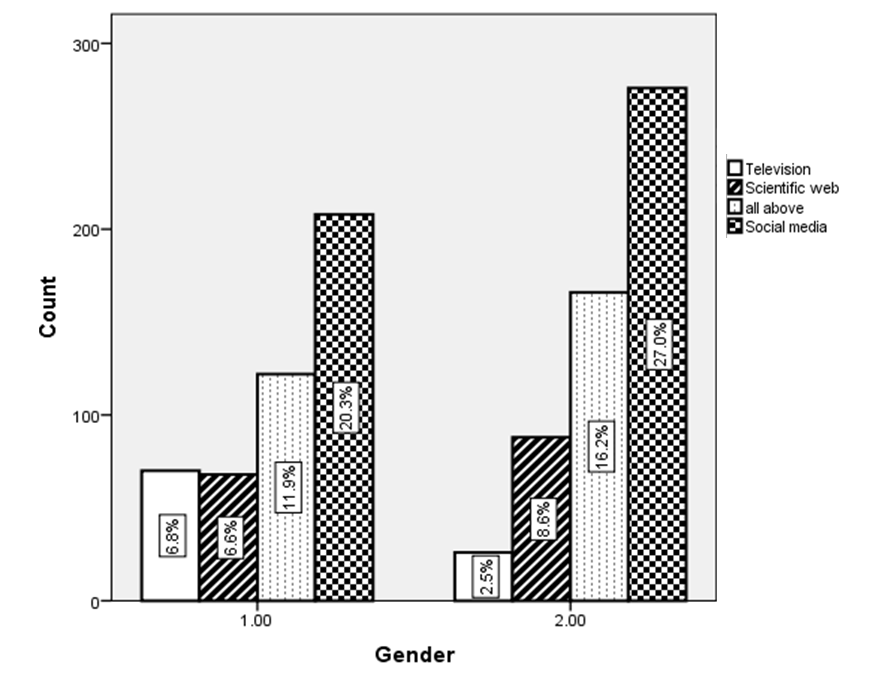 | Figure 1. Source of Information about Coronavirus, 1=Male, 2= Female |
3.2. Social Perception of Quarantine
- Nearly 95% of Iraqis had a good view of quarantine and a vast majority of participant had a bachelor's degree and more (n = 710, 68.5%, P <0.05). Almost all contributors agreed that they had cooperated in telling health authorities if someone might be infected with COVID-19 (n = 912, 88%) however, approximately 12.0% of the participants were uncooperative as shown in Table 2.
 | Table 2. Association Between Respondents’ Characteristics and Perception of Quarantine (N=1036) |
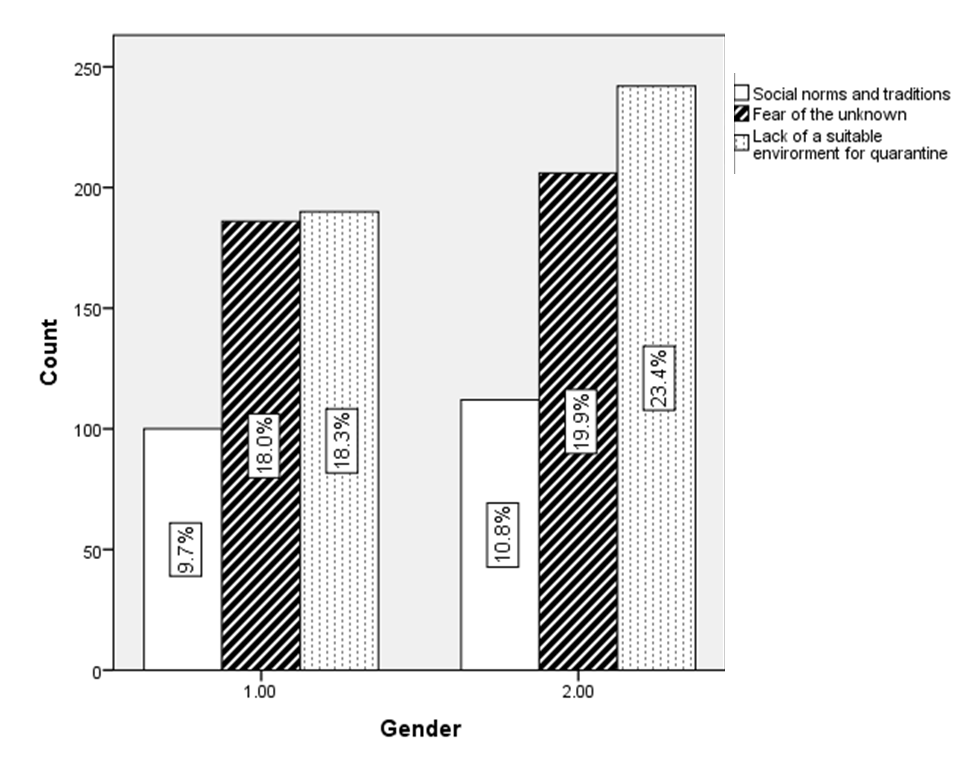 | Figure 2. Reasons for Dodn't Inform Health Authorities about Cases of COVID -19 Infection,1=Male, 2= Female |
3.3. Commitment with Recommendations of the Ministry of Health
- A significant number of the Iraqi people showed a positive perception of quarantine. Closely to 80% of participants always washing hands well with soap and water or disinfectant to avoid COVID-19 transmission in their daily lives as shown in Table 3.
|
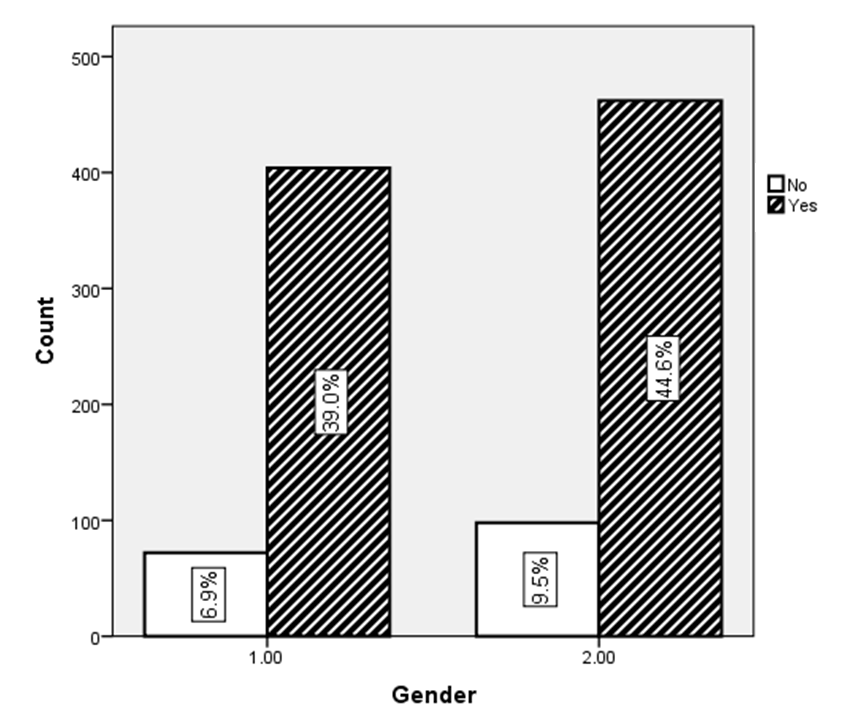 | Figure 3. Percentage of Paticipant Believe that Consuming Some Vitamins Can Strength Immune System, 1=Male, 2= Female |
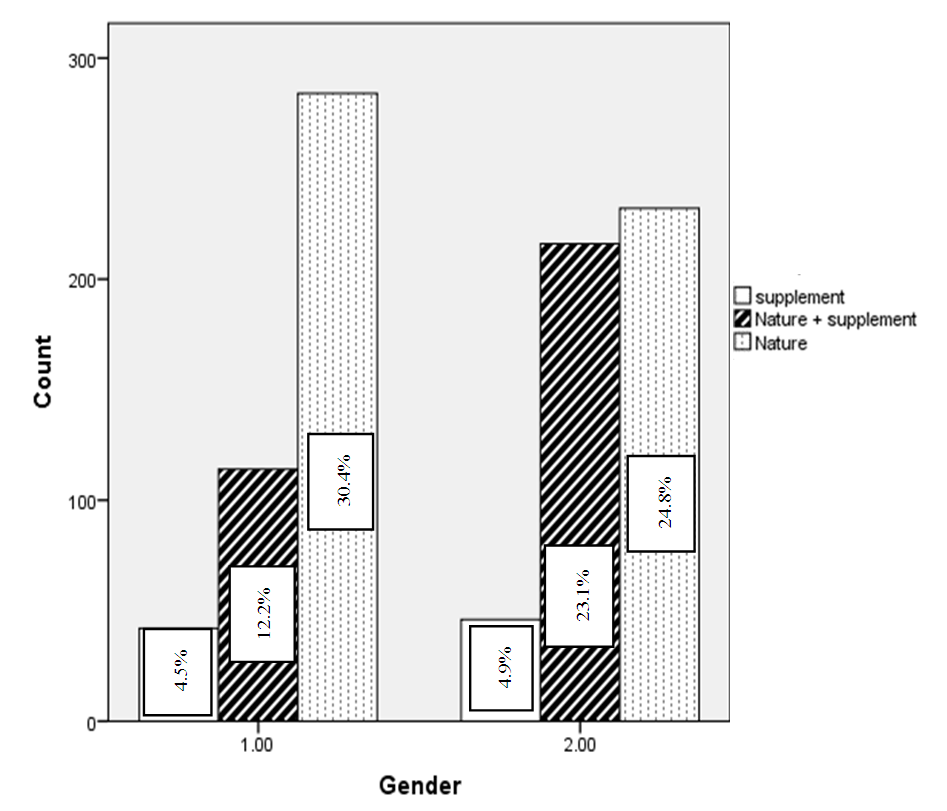 | Figure 4. Correlation Between Gender and Source of Vitamins, 1=Male, 2= Female |
4. Discussion
- CoV is currently a global topic of discussion in the media and among society. With the presently mounting COVID-19 transmission raising tensions for everyone, the implementation of quarantine measures early in an outbreak may delay the implementation of the disease into a country or region or may delay the height of an epidemic in an area where local transmission or both is underway. Nevertheless, if not adequately applied, quarantine can also establish potential sources of disease infection and spread [14]. Thus, the Iraqi government is enforcing the quarantine early in all Iraqi cities to prevent the transmission of COVID-19. For this reason, during a global outbreak of COVID-19, and after two weeks of implementing the quarantine in Iraq, we examined the Iraqi society's knowledge about quarantine to prevent and control the COVID-19 transmission.This study revealed that the knowledge and awareness about implementing the quarantine varied across different categories of Iraqi people. The study found that the Iraqi people had a good view of performing the quarantine because a vast majority of 95% of Iraqi have implemented the quarantine and stay at home.This survey has shown that about 47% of the Iraqi used social media as the first source of information about CoV. This survey indicated that the CoV-related updates posted online by many websites. Today, the wide variety of information available on the Internet, containing unconfirmed malicious information, can spread rapidly, and some time can misguide society. Health officials and scientists especially have cautioned that widespread misinformation about CoV is a severe problem that triggers xenophobia around the world [14,15].A vast majority of Iraqis accepted the quarantine to avoid infecting this global virus. Firmly 95% of the participant had a good view of quarantine, and this may be due to most of the participants had a bachelor's degree and more (68.5%). Quarantine, which lowers the rate of CoV transmission, means the restriction of movement of people who are thought to have been exposed to the infectious disease but are not sick, either because they have not become infected or because they are still in the incubation period. Quarantine may be enforced at the individual or community level and typically includes a restriction on the house or facility designated. It plays a significant function in controlling CoV and lowers the rate of transmission among society. Also, it prevents the transfer from one country to another. It would appear that in these cases, quarantine and stringent measures to control the disease are necessary and should not be regarded as an ineffective measure [16-18]. The study showed that a vast majority of Iraqis strongly accepted that hygiene practices and cleaning of the equipment used should be done. Almost 80% of contributors still care to clean their hands well with soap and water or disinfectant to prevent transmission of COVID-19. Several studies focused on personal message safety to avoid transmission of COVID-19, such as handwashing with soap or hygiene, face mask, sterilization of equipment and environment surfaces, etc. [20,21]. To improve the functioning of the immune system, Iraqis are paying more attention to enhancing the immune system by eating particular food and vitamins such as C and D. A substantial proportion of participants, therefore, agree that these foods would improve the immune system. In the absence of medication for this viral infection, alternative methods for managing the disease's spread are urgently needed. It was proposed that each infected patient's nutritional status should be assessed before general treatments are provided. Improved immune function and increased resistance to infection are observed in hosts with vitamin A deficiency following supplementation [22,23]. During acute infections, the CoV can be presumed to be just as susceptible to vitamin C as all the other viruses it is highly successful. There has never been a recorded situation in which sufficiently high doses of vitamin C were unable to neutralize or destroy any virus it was tested. Both SARS-CoV and current Chinese CoV were prevalent in winter when vitamin D is the lowest [10]. Therefore, Recent study found a correlation between higher vitamin D levels and fewer COVID-19 cases and deaths in 20 European countries. This study showed that patients with relatively higher vitamin D levels had fewer cases of coronavirus and lower mortality rates [24]. Also, another study stated that there is a link between deficiency in vitamin D and a complication known as a cytokine storm that occurs when the immune system goes into overdrive. Also, COVID-19 can cause an excess of those cytokines according to this research [25]. In addition, B-complex vitamins and vitamin A tablet with each meal will supply these conveniently and economically [10,11]. Thus, supplements are not just a good idea to fight viruses, they are absolutely essential and indispensable in our live.
5. Conclusions
- The survey found that a vast majority of Iraqi society had a favorable view of quarantine, resulting in decreaseing the contaminated cases compared to other countries. Iraqis also pay greater attention to strengthening the immune system by consuming certain foods and vitamins, such as C and D. Consequently, Vitamin C and D supplementation may be recommended to protect against COVID–19 Infection. Additionally, the study found that a high proportion of participants stated that quarantine had an effect on their income. While COVID-19's threat begins to arise, greater government efforts should be made to protect the people who suffer during the quarantine time.
ACKNOWLEDGEMENTS
- We thank all the participants in this study for their voluntary participation and for providing important information. Also, thank you so much to Mr. Sayed Hasan Diwan for assisting in the proofreading.
 Abstract
Abstract Reference
Reference Full-Text PDF
Full-Text PDF Full-text HTML
Full-text HTML